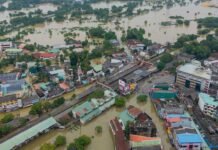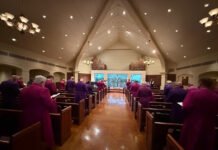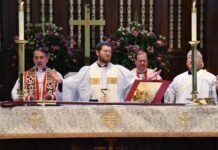I’m in Canterbury, England, at the Lambeth Conference of bishops. It’s August the
second. I don’t have a script in front of me, but I did want to talk with you—just briefly,
especially for our LGBTQ family. I know that there is legitimately some anxiety and
concern about the conversations and the direction that might emerge from this Lambeth
Conference, specifically regarding same-sex marriage.
I want you to know, though, that at the end of this day, when we did discuss same-sex
marriage and marriage in general, in the context of talking about human dignity, and the
ministry of reconciliation in Christ, I left that conversation hopeful. I left it hopeful, not
because we all came to agreement across all of our differences. No, no, we didn’t even try
to do that. I left hopeful not because I convinced anybody of where I stand, or that they
convinced me of where they stand. I left hopeful because this group of bishops today
seem to be able to recognize and affirm our love and respect for each other as brothers
and sisters in Christ in the body of Jesus Christ. And that we could find a way to honor
and respect our differences. If we love each other, and love our Lord. That, my friends, is
a sign of hope. That is a sign of hope. That makes room and space for all of us to be in
the course of our conversations.
There was a document that we reflected on—we didn’t take any votes; we didn’t try to do
that—it was called a call on human dignity. And in this call on human dignity, the
premise that was behind the document was that we have all been created in the image and
likeness of God. And that that image of God confers a dignity and a worth on every
human being. My daddy used to say nobody got any more of that image than anybody
else. We all got it equally which means we are equal before God, and we should be equal
before the law.
We began our discussions around human sexuality and around marriage. With that in
mind, and in the document that we were reflecting on, that document said that we in the
Anglican Communion live with a plurality of views on marriage. That there is what
might be called a traditional view of marriage between a man and a woman, and that
view is held probably by the majority, certainly, of Anglican churches around the world
and probably Anglicans—but that there is another view equally to be respected: a view
that includes and embraces same-sex couples who seek the blessing of God on their
loving relationships, their commitments and their families.
My friends, I’ve been a bishop 22 years. I’ve been a priest over 40 years. And I have to
tell you that as far as I know that is the first time a document in the Anglican Communion
has recognized that there is a plurality of view on marriage. And that these are
perspectives that reflect deep theological and biblical work and reflection. That they
reflect and respect the context in which we live and seek to address the pastoral needs of
our people, of all the children of God—that’s why I say today is a hopeful day.
There is work to do, but hope can help us run the race that is set before us. As the prophet
Isaiah said, “They that wait upon the Lord shall renew their strength. They shall mount
up on wings like eagles. They shall run and not be weary. They shall walk and not faint.”
This group of bishops today are finding a way to walk together as a church.
And the words that have echoed in our ears over and over again have been the words of
Jesus: “By this everyone will know that you are my disciples.” Not that you agree. But
that you love one another. And so we are still walking together. And in our church, we
are making “plenty good room” for all of God’s children.
God love you. God bless you. And may God hold us all in those almighty hands of love



